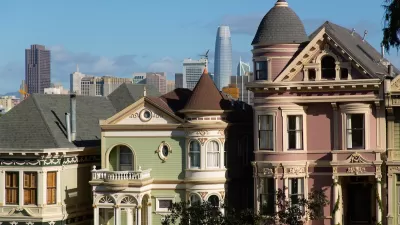In a precautionary essay about moving to another place, Chuck Wolfe explains tensions between simple and practical community life and newcomers’ arguably gentrification-laced expectations.

Wolfe writes that an evolving understanding of time and place must be based on the premise that every newcomer must respond humbly to land other than their own — even if it means abandoning expectations imported from elsewhere.
He illustrates his story through Johnny, a mover whose family has been in the area since Santa Fe’s founding in 1610, with repeated experiences with those who visit Santa Fe on vacation, fall in love with its surface beauty and promptly decide to relocate to the “City Different” with an imported NIMBY (not in my backyard) point-of-view:
His grandparents—in their mid-80s— live in a neighborhood his family has called home for generations. Increasingly, they find themselves surrounded by newcomers who express discomfort with their long-standing ways.
Something as simple as front yard parking—a practice that predates zoning laws and, to some, is simple and practical community life—has become a point of contention. Johnny explained that these new neighbors often arrive with rigid preconceptions of how a historic neighborhood “should look,” missing that his grandparents have maintained the practice for years.
In conclusion, he underscores what should be a first principle for today's planners: Genuine appreciation and administration of a place require a deeper understanding and respect for its complex and intermingled ecosystems (built, natural, and cultural) and a responsibility to approach them as thoughtful participants in a continuing story.
FULL STORY: About Roots: The Importance of Newbie Humility

Planetizen Federal Action Tracker
A weekly monitor of how Trump’s orders and actions are impacting planners and planning in America.

Restaurant Patios Were a Pandemic Win — Why Were They so Hard to Keep?
Social distancing requirements and changes in travel patterns prompted cities to pilot new uses for street and sidewalk space. Then it got complicated.

Map: Where Senate Republicans Want to Sell Your Public Lands
For public land advocates, the Senate Republicans’ proposal to sell millions of acres of public land in the West is “the biggest fight of their careers.”

Maui's Vacation Rental Debate Turns Ugly
Verbal attacks, misinformation campaigns and fistfights plague a high-stakes debate to convert thousands of vacation rentals into long-term housing.

San Francisco Suspends Traffic Calming Amidst Record Deaths
Citing “a challenging fiscal landscape,” the city will cease the program on the heels of 42 traffic deaths, including 24 pedestrians.

California Homeless Arrests, Citations Spike After Ruling
An investigation reveals that anti-homeless actions increased up to 500% after Grants Pass v. Johnson — even in cities claiming no policy change.
Urban Design for Planners 1: Software Tools
This six-course series explores essential urban design concepts using open source software and equips planners with the tools they need to participate fully in the urban design process.
Planning for Universal Design
Learn the tools for implementing Universal Design in planning regulations.
Heyer Gruel & Associates PA
JM Goldson LLC
Custer County Colorado
City of Camden Redevelopment Agency
City of Astoria
Transportation Research & Education Center (TREC) at Portland State University
Camden Redevelopment Agency
City of Claremont
Municipality of Princeton (NJ)





























